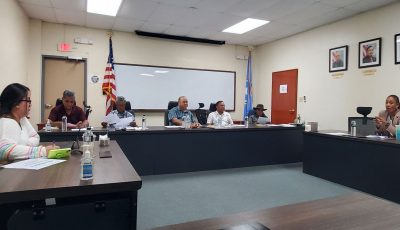‘This is not the normal way we treat workers’
Jose, not his real name, was nearly done completing his requirements for a construction job in New Zealand when one of his friends told him that an investor on Saipan also needs laborers to complete its hotel project. The offer of higher pay, close to $15-an-hour plus overtime, attracted him and his friend to try their luck at working in the Commonwealth.
He and his friend are among the scores of skilled Filipinos who were lured to jobs building the casino on Saipan. They arrived on Saipan in the middle of the year under H-2B visas that’s required for construction workers. They began working at the Imperial Pacific Resort, which casino investor Imperial Pacific International (CNMI) LLC is trying to complete within the two-year extension period given to them by the CNMI Lottery Commission.
However, last Oct. 12, the contracts of Jose, his friend, and 68 other Filipino construction workers—masons, carpenters, and plumbers—were terminated despite having obtained a four-month contract extension—from Sept. 1, 2018 to Jan. 30, 2019. The job extension came on Aug. 31; also, their H-2B visas were renewed.
Marlon Cruz, another worker, had to go back to the Philippines to complete the process of his H-2B visa that expired after the stamp said he was a plumber when it should have been riveter. “The stamp on my visa was wrong and that’s why I have to go back to Manila. I used my own money when supposedly they should have shouldered my expenses.”
He told the Saipan Tribune that the U.S. Embassy in Manila issued him the H-2B visa and he updated IPI so the company could book him a return ticket to Saipan. Days passed and he did not receive any word until the visa issued to him again expired. He recently learned that 80 of his co-workers have been laid off.
“I was really expecting to go back once I told them that my visa renewal was approved. But I think I will no longer have that chance since I learned that my co-workers there were laid off. I’m out of work since I also resigned from my previous job since IPI had already hired me,” he said.
IPI echoed a previous statement it released about the job terminations, that they are in the process of adjusting their workforce.
“The purpose of the reduction is to adjust the level of labor supply based on the demand of the construction project. This adjustment is in line with effective workforce planning and efficiency improvement of the project.”
IPI also said the workers would be paid seven days of salary from the date they received the notice of termination and the company would shoulder these workers’ return ticket to the Philippines.
All workers interviewed for this story asked that their names be withheld.
Assistance
The workers sought the help of the local Labor department, the Micronesian Legal Service Corp., the Office of the Philippine Honorary Consul to the CNMI, the administration of Gov. Ralph DLG Torres, and foreign worker advocate Irene Holl.
There’s a possibility that the workers may file a complaint with the National Labor Relations Commission in the Philippines. The Philippine Honorary Consulate’s office said they would assist the workers in getting benefits at the Philippines’ Overseas Workers Welfare Administration.
They also filed a complaint with the MLAC where they stated that IPI did not state any reason why their employment contracts were terminated and that some of them have yet to be reimbursed for the cost of buying their protective equipment—goggles, hard hat, shoes, and vest—that they used at the site.
They added the notice that they are going to be provided seven days of salary is also incorrect. “[The] contract requires both seven days prior notice during which time I am entitled to work and be paid and an additional seven days of payment of separation and/or termination pay.”
Some Filipino business owners also pitched in to help and even offered to provide temporary housing to all the displaced workers and other assistance that they could give.
Not our way
Torres and Rep. Angel A. Demapan (R-Saipan) met with some of the workers yesterday at the conference room of the Office of the Governor on Capital Hill to hear their concerns.
Other construction firms that are in need of laborers and other related positions had already approached some of the 80 workers.
Torres said he’s going not going to promise anything but he would try to work something out to see if there’s an opportunity for some of the workers to return as CWs based on the categories that are in demand in the CNMI. “We’ll try to see if some of them has any opportunity of being CWs.”
“I encourage other companies that are in need of electricians and other different categories to see if we can have at least some of them come back here.”
Demapan said what happened to the workers was an unfortunate situation. “This is one of the issues that we have with the H-2B. That’s why we made a strong push for CW because there’s more certainty and stability [of jobs] in the program. But since we’re under the federal control, we have to use H-2B visas.”
“This is not the normal way we treat workers. This is not the normal way that we do business. We hope that when they return home, they return with good memories and to have the opportunity to come back and work again in the CNMI. They had provided their information and we will see who from this group can come back as CWs for positions that have no U.S. citizens available.”



























